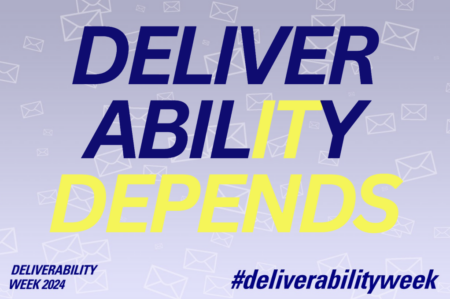Why Deliverability Depends

A common complaint about the advice or answers any deliverability person gives is that the generic answer to questions is: It Depends. This is frustrating for a lot of folks because they think they’re asking a simple question and so, clearly, there should be one, simple, clear answer.
The problem is that there is almost never one answer in deliverability and details do matter.
Let’s take a common question: How do I authenticate my email so that it meets the new Yahoogle standards? It’s a simple question, and gets the simple answer: you need to sign with your own domain in DKIM and publish a DMARC record for the domain in your 5322.from address.
That’s not a wholly complete answer, though, and won’t always address the full needs of the organization. What if the domain in the 5322.from is a subdomain? What about all the other mailstreams?
Before any good deliverability person can give you a good answer that question they need to know the following:
- How much volume do you send per day that goes to those domains? Not just marketing mail, but also corporate mail, any alerts and transactional mail, any monitoring emails your IT department has set up. Does your volume, on any day go over 5000 messages to those domains?
- What are your sources of all those types of emails? I’m going to assume marketing uses one ESP, and possible a second ESP handles transactional mails.
- What’s your corporate outbound setup?
- Does your ESP allow you to set up custom Return Path domains? Have you done that? What is that domain?
- Are you on a dedicated IP address or a shared IP address for your ESP mail?
- Do you want to use different d= values for different mailstreams or do you want to use the same d= for all your mailstreams?
- What’s your current authentication scheme?
That’s one example of a simple question that when you start to dig under the covers, doesn’t actually have a simple answer that covers all your use cases.

What are you trying to do?
That was a relatively simple authentication question I asked above. There are clear and precise answers, but there are also clear and precise answers that have the ability to screw up other parts of your mailstream. We don’t want to give advice that fixes your problem but breaks something elsewhere in your mail stream. There are lots of ways to break email, trust me, I’ve discovered a lot of them through the years and am sure I’ve not found all of them yet.
The answers to complicated questions are even harder. “How do I fix my reputation at Gmail?” is a good example. The simple answer is: “Send mail only to people who want it and who are receiving mail in their inbox for a period of time and then increase the volume slowly and with good recipients.” But that’s not really explaining how, is it? That’s the method, but the detail of which recipients to pick, the details of which addresses to ramp with, aren’t in the answer. It’s a technically correct answer but a practically useless one.
Multiple methods, one right method
In most cases any “how do I” question in deliverability has multiple answers that will all work. Some of those answers are more appropriate than others for a particular situation. When we say “… it depends” it means we can give you a five answers, but if you want the appropriate one for your situation, then you’ll need to give us more details.

I know it’s frustrating to hear the answer “it depends” when it comes to email and deliverability. But email and deliverability are parts of a complex system with many choices. There are many paths to the inbox. Knowing the details of a situation is crucial to getting you the right answer, not just the generic answer.
It really does depend.